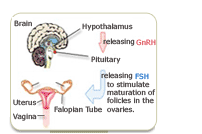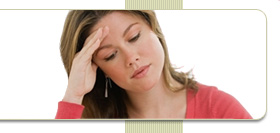34 MENOPAUSE SYMPTOMS |
HEALTH CENTER |
|
| |
|
|
|
|
|
|
Women are at a particular risk for depression during menopause, but often ignore their symptoms or accept them as an inevitable part of aging. Depression can trigger serious health problems and significantly degrade quality of life. Keep reading to learn more about the symptoms, causes and treatment options for depression.
Depression - Brief Explanation
According to the National Institutes of Health (NIH), depression can be defined as "a medical illness in which a person has feelings of sadness, discouragement, and a lack of self-worth." The National Institute of Mental Health (NIMH) states that 12.4 million women in the U.S. suffer from depression each year.  |
|
|
Depression - Symptoms
Women suffering from depression typically experience intense sadness, feelings of guilt and low self-esteem, and withdrawal from friends, family, and normal activities. Women with depression are also more likely to experience anxiety, insomnia, and eating disorders. For a diagnosis of depression, these symptoms must persist for at least two weeks.  Depression - Causes
Depression - Causes
A variety of factors can have an impact on emotional health, but during menopause hormonal changes put women at an increased risk for depression. Estrogen hormones influence several stages of the production of serotonin (the brain chemical that regulates mood). When estrogen levels fall, serotonin levels decrease as well. An inadequate level of serotonin is thought to be a major factor in depression.  Depression - Risk Factors
Depression - Risk Factors
Women with a history of premenstrual syndrome (PMS) and/or postpartum depression are more likely to experience severe depression during menopause, as are women who undergo surgical menopause. A family history of depression or sensitivity to hormonal changes may also indicate a greater risk for depression during menopause.  |
|
|
|
Depression - Treatments
Untreated depression can seriously degrade quality of life, increase the risk of suicide, and trigger other health problems. It is thus essential for women experiencing symptoms of depression to seek help as soon as possible. To overcome depression, the problem should be treated at its source: hormonal imbalance.  |
|
Depression may feel relentless, but there are different treatment options that can bring relief. Keep reading the section below to learn about the most effective treatments for menopause-related depression, including lifestyle changes, alternative treatments, and medical procedures.
|
|
|
|
|
Treatment for Depression
with
MacaActive Supplements |
|
As you have already read, depression are mainly brought on by falling estrogen hormone levels, which is a natural part of aging. If you want to get rid of this undesirable symptom, you must restore estrogen hormones to normal levels.
Today, there are three effective ways to normalize hormonal levels: lifestyle changes, alternative medicine and drugs & surgery.
|
|
 |
Lifestyle Changes: This first level of treatment involves no risk, but may be the hardest way to go because you'll have to restrict yourself from many things. That's why most people consider the next level of treatment, alternative medicine, which has proven to be excellent for treating depression in a safe and natural way.
|
|
 |
Alternative medicine: There are two types of herbal supplements for treating depression: those containing phytoestrogenic herbs, and those containing non-estrogenic herbs. Phytoestrogenic herbs (like Black Cohosh) are filled with phytoestrogens, which are similar to estrogens. They can increase low estrogen levels by replacing some of the missing estrogen hormones. This isn't the best solution, however, because your body will become less responsive to producing estrogen on its own, causing a further decrease in body-own hormone levels. Unlike phytoestrogenic herbs, non-estrogenic herbs don't contain estrogen, but they nourish the hormonal glands to work more efficiently. This ultimately results in balancing not only estrogen, but other necessary hormones, as well. Using non-estrogenic herbs is one of the safest and best ways to treat depression naturally.
An excellent example of a safe and effective non-estrogenic herb for hormonal imbalance is herbal MacaActive. What makes MacaActive so special is its ability to balance hormonal levels in women by nourishing the hormonal glands. In this way, it alleviates most disorders related to hormonal imbalance, including depression.  to read more about MacaActive.
|
|
 |
Drugs and Surgery: This level of treatment has the highest risk and often the highest cost. The most common drug therapy for treating depression in the US is hormone replacement therapy (HRT). There's no doubt that this is the quickest and strongest way to combat hormonal imbalance. Unfortunately, it entails serious side effects and increases the risk of different types of cancer in women. If you still want to consider this approach, see your doctor to become better informed about what this treatment option involves.
|
|
A safe way for balancing hormones:
Non-estrogenic herbs are the most effective solution for treating hormonal imbalance and its related symptom, depression.
MacaActive is an excellent non-estrogenic herb. It's simple: rather than putting hormones from the outside into your body artificially, MacaActive stimulates your hormone glands into producing the necessary hormones naturally. This is what makes MacaActive supplements so unique.  to read all about MacaActive. |
 |
|
| Sources:
Carolyn Chambers Clark. "Living Well with Menopause: What Your Doctor Doesn't Tell You... That You Need to Know"
Mary Jane Minkin & Carol V. Wright. "A Woman's Guide to Menopause and Perimenopause"
Erika Schwartz. "The Hormone Solution: Naturally Alleviate Symptoms of Hormone Imbalance from Adolescence through Menopause" |
|
|
| |
|
|
|
|







